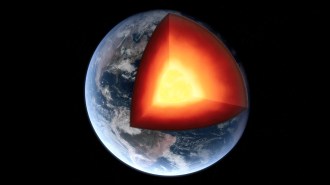Earth/Environment
Monsoons may have sped India's tectonic plate, plus saber-toothed reptiles and leaden bones in this week's news
Leaden bones may impair heart rhythms
A team of U.S.
scientists finds that people with the most lead in their bones could be at
elevated risk of developing perturbed electrical cycles in the heart, as
measured by electrocardiograms. The body treats lead as it does calcium,
storing much of the toxic metal in bones. The electrical changes emerged during
an eight-year study of roughly 500 otherwise healthy elderly Boston-area men
and occurred in the men with the highest lead levels (likely due to exposures
from dust and tainted water). Although the mechanism is unknown, lead has been
associated with elevated blood pressure and may increase the resistance of
blood flow through vessels. Such changes could signal individuals at risk for
sudden death, the researchers report online March 17 in Environmental Health
Perspectives. —Janet Raloff
Climate affects tectonic motion
India’s monsoon may have sped up the rotation of the tectonic plate the subcontinent rests on. Starting about 10 million years ago, the monsoon became more intense, causing more rain that eroded the high elevations of the Himalayas. Spreading that rock and dirt around at lower elevations affected the counterclockwise spin of the Indian plate, says a team led by Giampiero Iaffaldano of the Australian National University in Canberra. Parts of India may have sped up as much as 8 millimeters a year, the team reports in an upcoming Earth and Planetary Science Letters. —Alexandra Witze
Saber-toothed plant eater
Teeth line up for a bite much as modern mammals’ do, and whopper saber canines hang from the upper jaws of a fossil from a newly described plant-eating species recovered in 260-million-year-old rock in Brazil. The beast, now christened Tiarajudens eccentricus, belongs to an ancient branch of terrestrial four-limbed animals called therapsids. All these flashy teeth may offer clues to how early land-dwellers lived at the time that mammal ancestors were developing, says a team of researchers in Brazil and South Africa in the March 25 Science. —Susan Milius







